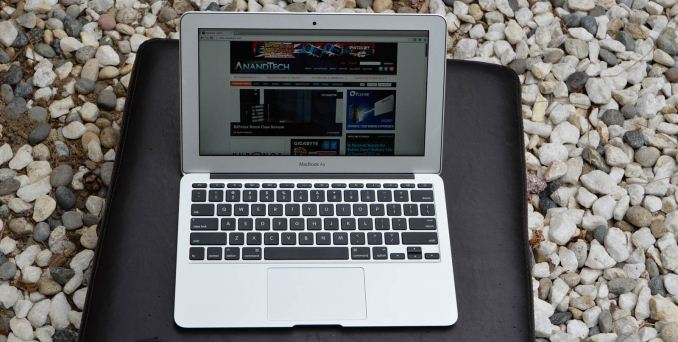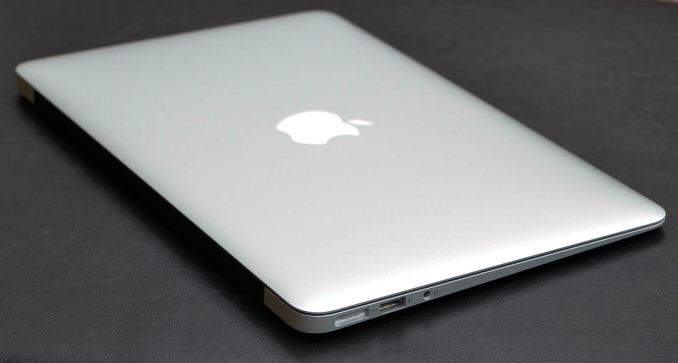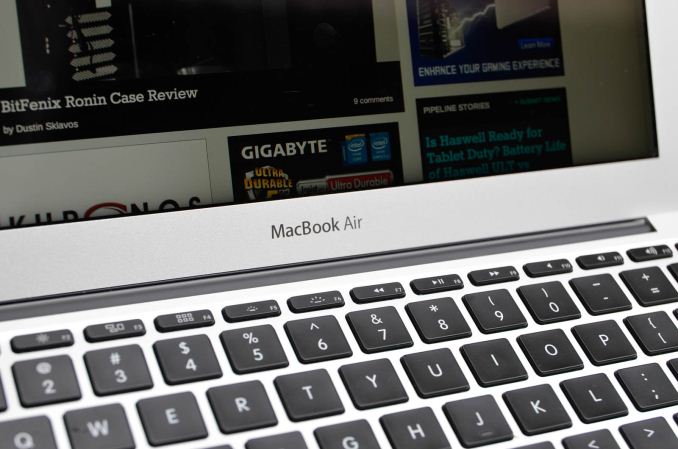The 2013 MacBook Air Review (11-inch)
by Vivek Gowri on August 9, 2013 1:45 AM ESTI come away from the 11” Air with mixed feelings. The modern silicon and generally better specced 2013 model has turned the 11” Air into a far more well rounded notebook than it has been in the past, at least in base $999 form. Unfortunately, the rest of the picture isn’t as rosy. The chassis and especially the display are starting to show their age, even more so than in the 13” Air, and anyone looking for any kind of performance gain over the previous generation is out of luck. The battery life is awesome, it really changes the way you approach the system, and I still love this form factor, but it’s hard to look at this and not compare it to an Ultrabook with a far better display for the same price.
I know Anand has long said that Macs and PCs don’t get cross shopped that often, but recently I’ve been asked for notebook advice by a lot of people who are completely platform agnostic. With the emphasis on web apps, there’s not much holding a normal consumer to one platform or the other unless they have a specific reason (gaming, media creation, familiarity) to ignore one of them. So when you look at something like Sony’s VAIO Pro 11, with a 1080p IPS 11.6” capacitive multitouch display, roughly similar specs (1.6GHz i5-4200U, 4GB, 128GB PCIe SSD), a half-pound lighter body (1.92lbs) with similar dimensions, and roughly the same price point—$1049 street price at the time of writing—it makes you think.
Sure, you lose some of the niceties you get with the new Air—802.11ac, Thunderbolt, the best touchpad in the world (you can’t find another laptop in the world with that combination of things at any price, at least until the next generation of MacBook Pros come out this fall)—and Windows 8 notebooks have never been able to match the battery life of Apple’s notebook line. Sony claims 7 hours of runtime on the 34Wh battery, though it’s worth noting there’s an optional slice battery that adds an extra 35.2Wh of capacity at the cost of a 0.6 lb weight gain. The real question though, how much of the added features would be worth sacrificing for that display upgrade?
On a more global scale, I feel like this is the end of the line for the current MacBook Air chassis. It’s been around for a handful of years now, and I honestly can’t see Apple keeping it around for another go-around. Particularly given how much smaller the Haswell ULT package is and how much less populated the 2013 Air PCB is relative to its predecessors, a sleeker redesign for Broadwell seems inevitable. I’d love to see them get this closer to or even under under the two pound mark without sacrificing the aluminum chassis, because that would really push the boundaries of mobility. I’d like smaller bezels around the LCD as well, though that is more dictated by the size of the keyboard and trackpad than anything else.
Also, it’s clear that something has to give with regards to the displays. I’m not sure when it’ll happen, but it’d be very odd for Apple to continue iterating a thoroughly modern, bleeding edge computer without changing the five year old display panel at some point. Considering all that Apple has done over the years to push notebook displays, it’d be very out of character for them to not address this issue within the next couple of years, particularly as the internal silicon gets so much more power efficient.
Given where this generation of Apple portables has gone, I think the upcoming MacBook Pros will be very interesting. Apple has really prioritized battery life, and the whispers of no dedicated graphics in either MBP makes things very interesting (if a bit concerning from a performance standpoint). If the 54Wh battery in the Air 13” gets to 11 hours of battery runtime without too much trouble, just imagine what the 74Wh battery in the rMBP13 or the 95Wh battery in the rMBP15 can do with Haswell’s power efficiency, particularly if the updated MBP13 gets a single chip 28W Haswell ULT part with Iris graphics. I get chills just thinking about it.
But in terms of the 11” Air, the main point of comparison that needs to be addressed is the 13” Air. I know I covered this in the intro, but it’s worth revisiting. The 13” is without question the better computer, and if you’re looking to replace a laptop, it’s definitely the way to go. I like the 11” Air as a tablet replacement—I’d rather carry this than my iPad on almost every day of the week (unless I need the built-in LTE). It’s almost impossible to use as a primary system though, the way you can with the larger Air. The difference-maker relative to the 13” Air isn’t the weight, since that’s still quite light at 2.96lbs, but the footprint. While the 11” Air is small enough to fit basically anywhere an iPad can be carried, the 13” is much closer to the size of a real notebook. The fact that I’d be making minimal compromises to carry a real notebook versus the iPad is startling, and if you need the most mobile productivity machine you can get, it’s hard to top this. As we start to see more Haswell-based ultraportables and tablets, particularly when the Haswell ULX (Y-series) parts hit, this might change, but for now I feel pretty comfortable saying that.













139 Comments
View All Comments
jutre - Thursday, August 15, 2013 - link
Sorry name99, but I do not really mind your opinion, given your clear lack of judgment in posting comments. If you re-read carefully my post and the one from purerice, you will not find any complaint.jutre - Thursday, August 15, 2013 - link
I have not worked with a SSD-based computer so far. I am used to keeping multiple applications opened at the same time, because launching them takes to much time, so I really need 8Gb or RAM on my 2009 Imac. With an SSD-based laptop, maybe usage patterns change and you no longer need as many apps opened at the same time, so need less RAM ?HodakaRacer - Saturday, August 10, 2013 - link
Battery life and Performance with windows bootcamped? I know Anand tweeted about running windows on it..cindaydavilla - Saturday, August 10, 2013 - link
my buddy's step-aunt makes $61 every hour on the computer. She has been without work for 6 months but last month her pay was $14651 just working on the computer for a few hours. Here's the site to read more... www.max38.comccd2 - Saturday, August 10, 2013 - link
I disagree with you comment on the iPad versus MBA 11". After using the iPad for 6 months, I understand why you believe tablets are going to settle in at 7-8". That size tablet is easy to hold in one hand and, even more importantly, light enough to hold with one hand for extended periods of time. So why would I want the MBA which is even more awkward to handle??? It's even heavier, the keyboard does not fold fully around like the Yoga or detach. The MBA isn't better than an iPad because it can't be used the way most of us use a tablet.And as a PC? Why get the MBA when a larger PC like the 13" MBA is simply a better device?
Convergence devices like the 11" MBA have to make a decent compromise between tablet and PC to justify their often premium prices. I just don't see any device which has made a compelling argument for these devices. Some are getting close, like the Surface Pro or XPS12, but there is still more development to be done
FwFred - Saturday, August 10, 2013 - link
You hold a laptop (it's in the name "lap") far differently than a tablet. A 13" laptop is not awkward in the least. A 13" tablet is laborious to use. The point of the 11" is you bring your computer with you. When you get home, you can even dock it to a keyboard/mouse/monitor and use full fledged desktop software.I agree a 13" laptop is a better experience... unless you are very mobile and you always have your laptop stuffed in your bag.
ccd2 - Saturday, August 10, 2013 - link
You kind of support my point. Used as a laptop, in your lap, an 11" PC doesn't offer any real advantage over a 13" laptop. Stuffed in my bag, the weight difference doesn't matter much either. A 11" laptop needs to be some sort of convergence device for most of us, otherwise there are better options like a bigger laptop.Impulses - Saturday, August 10, 2013 - link
I've kind of given up on convergence devices for now... I enjoyed my Transformer, but I've moved on to a smaller Nexus 7. I was excited about Surface Pro, but it's just too much of a compromise for the price... Same for the 11" MBA. Even $500 Silvermount convertibles that finally break past the Atom performance envelope are unlikely to tempt me.I guess there's a reason the traditional laptop form factor has endured... I think some of the more interesting convergence devices are actually those that stick to one role without sacrifices and only offer extra versatility as a second choice... The Yoga 13 hinge design is rather appealing, I doubt I'd prop it up like an easel or whatever often but it takes nothing away from it's role as a laptop.
ccd2 - Saturday, August 10, 2013 - link
I agree. I'm looking at the new Nexus 7 as well. The problem with convergence devices is that they charge a premium for being a convergence, but just don't work that well. For the price of most of them, I can have a good 7" tablet and a larger PC with no compromises.name99 - Saturday, August 10, 2013 - link
The value of a large iPad is as a document reader. Not an eBook reader, but a technical document reader --- generally, but not limited to PDFs. This market appears to be large enough (individuals who most read tech documents, like myself, business use cases, and older people with bad eyes for whom the extra screen space is worth the other hassles) to sustain the 10" iPad indefinitely. Heck, if we assume the rumors to be true, there is enough of a demand for document readers that it makes sense for Apple to try a 13" iPad form factor.The basic point is that people use these devices in different ways. There is no way I would ever consider a 7" iPad -- it is useless for my specific needs. But obviously other people love it.
It is a waste of time from the point of view of market analysis to rely on anecdote ("I use this device in this way, and likewise all my [demographically identical] friends".)
Unless one has specific numbers regarding how people use devices, we have to rely on the common sense observation that if a company keeps making and selling a product, there is a substantial group of people who want it. Apple has been selling the 11" MBA for a while now. This seems to suggest that, in spite of your theoretical analysis, there IS a large enough group of people for whom this size is best that it remains a viable product.
I am sympathetic to your analysis. I have made a very similar analysis claiming that one of the reasons Surface Pro is not a viable product is because it fits uncomfortably between the cell phone (which everyone has and which serves mobile tasks well) and the laptop (which everyone has if they hope to do any sort of real work with Windows).
But at the end of the day, we have to calibrate these arguments to reality, especially if they're arguments from the gut without numbers to support them. I'd say reality supports my argument (Surface Pro is not and will not be viable) whereas it does not support your argument.
(It would be an interesting twist on your argument to consider why Apple can sell this form factor successfully whereas Windows cannot. Perhaps it is the very fit and finish of Apple --- a quality keyboard and trackpad --- along with OSX and its support for full-screen apps with maximum use of the display and easily controlled multiple virtual displays --- which makes the difference. A lousy keyboard and trackpad may be more painful in smaller form factor, and Windows full screen mode may still include enough chrome that each window is just that much less useful? In theory Windows8 Metro solves the chrome problem, but Metro has its own issues in that it does a terrible job of information density. Space isn't wasted in chrome, instead it's wasted everywhere.)